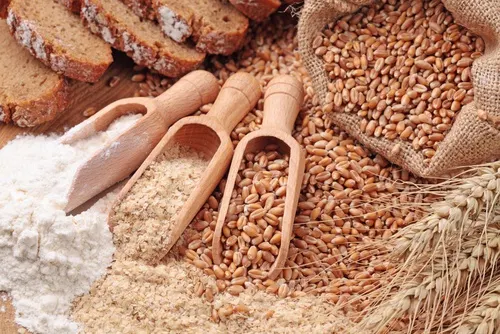7 Tricks to Avoid Gaining Weight When You Reach Menopause

With the passing of the years, it’s normal for the body to undergo various changes both externally and internally. However, in the case of women, when they reach menopause, it often becomes very difficult to avoid gaining weight. In fact, it’s even more difficult than usual.
This change is especially noticeable during menopause, the natural process in women that is characterized by the decrease of female hormones and the disappearance of ovulation. Let’s take a look at why.
What happens during menopause?
Menopause occurs naturally between 45 and 55 years of age, although it can develop prematurely in some cases that tend to be infrequent.
Because of the hormonal imbalances that menopause brings, the body inevitably goes through a series of transformations that imply a change in lifestyle. Hot flashes, urinary incontinence, and mood swings are just some of the symptoms that a woman must deal with in this new stage.
However, there is another aspect that a woman must deal with during menopause: weight gain. This is one of the biggest concerns for almost all women, since it not only affects them on a physical level, but also on a psychological level.
As estrogen and progesterone levels decrease, the body tends to accumulate more fat and lose muscle mass. For this reason, many women gain weight (generally between 5 and 10 pounds) during menopause.
Fortunately, by adopting good lifestyle habits, it is possible to avoid gaining too much weight and, at the same time, maintain well-being. Let’s take a look at some of them below.
Tricks to avoid gaining weight during menopause
In addition to taking into account your doctor’s instructions, it’s recommended that you take into account the following tricks to keep off the extra pounds during menopause. As you will see, most of them are a series of good habits that will not only help you feel good every day, but also prevent discomfort and even illnesses.
1. Consume more complex carbohydrates

Complex carbohydrates are those that don’t raise blood sugar levels and are slow to be absorbed. They’re characterized by being rich in fiber and vitamins, necessary elements for the good functioning of the body.
Among the main sources of complex carbohydrates, we find:
- Whole-grain pasta and flour
- Rice and whole grains
- Legumes
- Potatoes
We think you may be interested in reading this, too: High Life Expectancy: Why Do the Japanese Live Longer?
2. Include omega 3 fatty acids in your diet to avoid gaining weight
One of the main mistakes that people make in order not to gain weight is to completely eliminate all sources of fats from the diet. Although it is good to reduce the consumption of saturated fats as much as possible, it’s essential to take into account that the body requires this nutrient to a certain extent, especially unsaturated fats.
Omega 3 fatty acids are one of the fats that should not be missing in the diet of menopausal women. They are essential to fight inflammation and prevent different cardiovascular disorders.
3. Increase your fiber intake
Fiber is essential for all types of diets. However, during menopause, it should be consumed in abundance because of all the benefits it brings to the body. According to the study conducted by Dr. McRae of the National University of Health Sciences in Illinois, increasing its consumption helps to control cholesterol levels and reduces the risk of heart disease.
In addition, fiber is perfect for controlling food cravings and to not be tempted to eat more calories than appropriate.
Fiber is found in foods such as:
- Grains and legumes like lentils, corn, corn, and whole grains
- Seeds like almonds
- Fruit like papaya, plum, mango, guava, citrus, pear, and apple (with the peel)
- Vegetables and other tubers like potato peelings, carrots (raw), and green leafy vegetables
4. Don’t forget protein to avoid gaining weight during menopause
A decrease in muscle mass is one of the reasons why protein should never be missing in the diet, and even less so during menopause. Its consumption is decisive to strengthen muscles and increase physical performance.
The main sources of protein include:
- Lean meats
- Fish
- Milk and dairy products
- Nuts and dried fruits
- Eggs
5. Consume foods that are rich in calcium

Calcium is an essential mineral for the body and, in the case of women during menopause, even more so. As it assures this study conducted by Dr. Lugones Botell, its intake is involved in the prevention of bone density loss and the development of diseases such as osteoporosis.
The best sources of calcium include:
- Milk and dairy products like yogurt
- Fish
- Nuts and dried fruits
- Legumes
- Soybeans
- Broccoli
Note: The consumption of foods rich in calcium should always be carried out within a balanced diet, according to the needs of the body and your doctor’s guidelines. On the other hand, we should remember that it’s not by itself a way to prevent or treat diseases such as osteoporosis.
Like this article? You may also like to read: Eat Five Fruits and Vegetables a Day and Live Longer
6. Take vitamin D to avoid gaining weight during menopause
According to this research carried out by a team of researchers from the National Institute of Perinatology (Mexico), this vitamin is responsible for facilitating the absorption of calcium.
Sources of vitamin D include:
- Fish
- Cod liver oil
- Sunbathing 5 to 10 minutes a day
- In the form of supplements, if recommended by a physician
7. Do physical activity

A sedentary lifestyle is never a good option when it comes to taking care of your health. For this reason, experts from the World Health Organization recommend regular physical activity and exercise.
So, avoiding a sedentary lifestyle and maintaining an exercise routine is one of the best ways to keep the pounds off and, at the same time, take care of your overall health. In fact, the benefits can even be reflected in your mood. Exercise also benefits the cardiovascular system and maintains bone and joint health.
The best option is to practice about 45 minutes of moderate aerobic physical activity every day. Some of the most recommended activities to avoid being sedentary are:
- Dancing
- Riding a bicycle
- Swimming
- Brisk walking
- Jogging
This could be complemented with muscle and flexibility work:
- Maintenance gymnastics
- Weights
- Crunches
- Yoga
- Pilates
Discard harmful habits to avoid gaining weight during menopause
Remember that, in addition to these recommendations, you should avoid bad habits that have a negative influence on health, such as sedentary, smoking, alcohol, or regular consumption of fast food.
Following the tricks to avoid gaining weight that have already been discussed, you will not only avoid gaining weight, but you will improve your quality of life during menopause. So, what are you waiting for? Give them a try!
All cited sources were thoroughly reviewed by our team to ensure their quality, reliability, currency, and validity. The bibliography of this article was considered reliable and of academic or scientific accuracy.
- Landa Goñi, J., Lopes Rauno, P., Hernandez Nunez, J., & Nunez Palomo, S. (2002). Menopausia. Atencion Primaria. https://doi.org/10.1016/S0212-6567(02)79072-0
- Zárate, A., & Miranda, R. (1991). Osteoporosis y menopausia. Gaceta Medica de Mexico.
Arriagada M., M., Arteaga U., E., Bianchi P., M., Brantes G., S., Montaño V., R., Osorio F., E., … - Villaseca D., P. (2005). RECOMENDACIONES DE TRATAMIENTO EN LA MENOPAUSIA. Revista Chilena de Obstetricia y Ginecología. https://doi.org/10.4067/S0717-75262005000500011
- VV.AA. (2013). Papel de los ácidos grasos omega-3 en la prevención de enfermedades cardiovasculares. http://scielo.isciii.es/scielo.php?script=sci_arttext&pid=S0212-16112013000100001
- McRae, Marc. (Dietary Fiber Is Beneficial for the Prevention of Cardiovascular Disease: An Umbrella Review of Meta-analyses). https://www.ncbi.nlm.nih.gov/pmc/articles/PMC5731843/
- Lugones Botell, Miguel. (2001).Osteoporosis en la menopausia. Prevención y estrategias terapéuticas actuales. http://scielo.sld.cu/scielo.php?script=sci_arttext&pid=S0138-600X2001000300004
- VV.AA. (2015). Calcio y vitamina D en la paciente climatérica. https://www.sciencedirect.com/science/article/pii/S0187533715000187
- Organización Mundial de la Salud. https://www.who.int/dietphysicalactivity/pa/es/
This text is provided for informational purposes only and does not replace consultation with a professional. If in doubt, consult your specialist.








